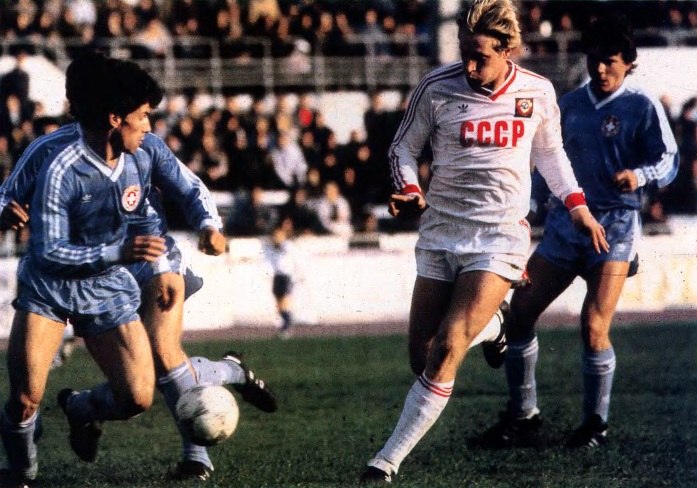
When we were asked to come up with an article on my favourite footballer my heart began to be pulled in a couple of different directions. In the end, I refused to make the footballing Sophie’s Choice (perspective and proportion are everything in football) that lay before me and instead opted to write two articles. This is the first and the 2nd, on Charlie Miller, will arrive soon.
Who is Oleksiy Oleksandrovych Mykhaylychenko?!
Kicking things off, I’m starting with Oleksiy Oleksandrovych Mykhaylychenko. Now at this point, I don’t blame you for staring pretty blankly at the screen. During his time in Scotland, this player was more commonly known as Alexei Mikhailichenko (or sometimes Mikhailitchenko).
The reason for the difference in names? Well, in Scotland, we tend to bump the Ukrainian/Russian/Belarusian tradition of giving the ‘patronymic’ in people’s names – the bit that means ‘son of’ (females would use the matronymic ‘daughter of’). That explains the Oleksandrovych bit (son of Oleksandr).
As for the spellings? At the point when Miko (we’re on safer ground with that name) arrived, he was known for his appearances for the USSR national team. The Soviet Union’s official default language was Russian, hence his name was transliterated from the Russian version into its English version.
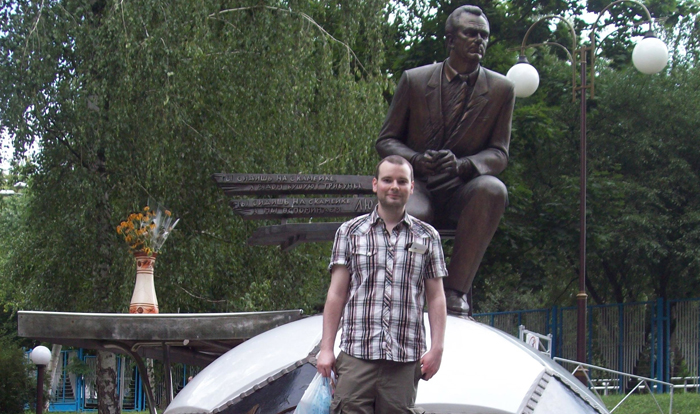
Then Ukraine became independent (take note, Vlad), Ukrainian achieved official language status and his name should now really be changed from that into English. Hence, the version of the name that I opened with. All clear? Good. Then let’s get to footballing matters.
Why did Miko make such an impact on me?
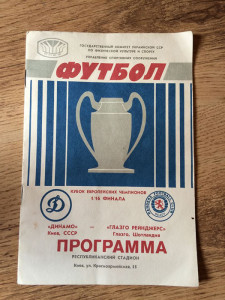 When I was a kid, I didn’t get to many Rangers matches (unless they were playing in Fife or Edinburgh) until around the age of 13. This meant that in what was probably his Rangers pomp – his debut season (he arrived in 1991) – I didn’t actually get to see him in the flesh. What he was to me was an exotic signing from behind the old Iron Curtain (the sight on TV of Rangers playing Steaua Bucharest in a stadium packed with people in military uniform and then the later collapse of communism also being played out on TV made a deep impression on my in my formative years), whose name I heard being breathlessly mentioned on either Radio Clyde’s Super Scoreboard (reception permitting) or BBC Sportsound on a Saturday afternoon.
When I was a kid, I didn’t get to many Rangers matches (unless they were playing in Fife or Edinburgh) until around the age of 13. This meant that in what was probably his Rangers pomp – his debut season (he arrived in 1991) – I didn’t actually get to see him in the flesh. What he was to me was an exotic signing from behind the old Iron Curtain (the sight on TV of Rangers playing Steaua Bucharest in a stadium packed with people in military uniform and then the later collapse of communism also being played out on TV made a deep impression on my in my formative years), whose name I heard being breathlessly mentioned on either Radio Clyde’s Super Scoreboard (reception permitting) or BBC Sportsound on a Saturday afternoon.
He’d also been part of two teams who had entered my young consciousness. The USSR team which had reached the final of Euro ’88 (the first international tournament I can remember watching the matches from – I was 8) and the Dynamo Kyiv (then they’d have been known as Dynamo Kiev for the same reasons as outlined earlier) side that Rangers had defeated over two legs in 1987. eBay allowed me to get my mitts on the programme from the Ukrainian leg of that tie (pictured left).
Making his debut against Falkirk as a substitute Miko decided to keep things calm and simple by merely trying to score from the halfway line. Something you can see in this video compilation:
What had he already achieved before Rangers?
It’s also worth noting the regard with which the great man was held in around Europe. In 1988, his exploits with that USSR team had led to him being 4th in the Ballon d’Or voting, in 1989 he was 12th and in 1991 he was 21st. In 1988 he’d also been named both Ukrainian Footballer of the Year and USSR Footballer of the Year. Being USSR Footballer of the Year was no mean feat in an era of Soviet players like Vasily Rats.
Miko had arrived from Sampdoria where he’d spent one season, winning Serie A. This formed part of a run that would see him win seven consecutive league titles with three different clubs from 1990 to 1997 (Dynamo, Sampdoria and Rangers).
Oh, and have I mentioned his Olympic gold medal? It won’t surprise any Rangers fans to discover that it wasn’t for sprinting (though more on that later) but was as part of the USSR men’s team that won gold at the 1988 Seoul Olympics.
Notable Rangers Moments?
You could probably class Miko’s time overall at Rangers as being an underachievement in relation to the abilities that he undoubtedly had but there were some special moments which make him stand out in my mind. I’ve already flagged up the attempt from the halfway-line on his debut, but he also got Rangers’ goal at the first Old Firm match I was at in the flesh.
It was a momentous and slightly surreal occasion as David Murray had banned the Celtic fans from the ground due to a dispute over payment for damage caused to seating in the ground at the last Old Firm game. At the time, I couldn’t compare the atmosphere to those with both sets of fans present but once I had the opportunity to do so I realised it was actually a far angstier affair. When your team’s 1-0 down in one of those matches… you really need somebody else to shout at.
Rangers had perennial reserve keeper Colin Scott in goals, due to an injury to Ally Maxwell who was already filling in for the injured Andy Goram that season. Standing outside the ground before the game, word had swept people that Maxwell was out. Then first-team coach Davie Dodds arrived and a kid asked what was up with Maxwell. Ever the diplomat, Dodds replied, “He’s f***ed his back”.
A predator boots-assisted John Collins free-kick had put Celtic 1-0 up before Miko somehow ghosted into space with the ball to equalise. He would also play a prominent part in another momentous Old Firm match. Miko got two of the goals that saw Rangers sweep into a 3-0 lead at Parkhead after 28 minutes of the 1994 New Year’s Day game. Rangers eventually won 4-2, with Miko’s compatriot Oleg Kuznetsov adding the 4th.
Celtic fans may actually have something to thank Miko for too. There were tumultuous scenes in the stands that days as Celtic fans hurled abuse (and some more tangible items) at their own directors. Both the results and the vitriol may have helped to speed up the overthrow of the old board and their replacement by Fergus McCann.
Weirdly, a Celtic fan even invaded the pitch to try to get at Rangers’ goalie Ally Maxwell; who was usually Celtic’s best hope of trying to get back into a match.
In His Own Words…
There aren’t too many quotes from Miko’s time at Ibrox as he had a self-imposed ban on speaking to the media, citing his poor English. In fact, his English was apparently perfectly passable when speaking to his teammates so it was more a matter of choice than necessity that saw him blank the Scottish cameras and journos.
Possibly he may have felt some embarrassment at a post-match interview following a Rangers cup final win (I think vs. Airdrie in the 1992 Scottish Cup Final) when he told a reporter that he was “feeling very beautiful today”. As if that’s anything to be ashamed of.
In Their Words…
I remember being allowed to miss school one day to go to the Rangers AGM with my dad. I’m thinking c.1994. Walter Smith was asked a question about whether the club should be getting “more out of” big money foreign signings like Miko. To much laughter, an eyes-twinkling Walter acknowledged that “Alexei is somewhat economical with his movement” and “warms up with hair dryer”.
In fact, there is a belief in some circles that the latter example actually took place in response to Archie Knox imploring the Ukrainian maverick to get out of the dressing room and warmed up for training.
The “Movement Issue”
I said that I’d get to discussing Miko’s perceived lack of movement. The strange thing is that he came through Dynamo’s selection and training processes when the club was managed (and basically run) by the legendary Valeriy Lobanovskyi. He was ahead of his time in that he used Moneyball-style computer analysis to work on tactics and player selection.
Because he wanted to be able to run other teams off the pitch (think Jurgen Klopp crossed with the manner and gravitas yet also tragic alcohol problem of Brian Clough), Dynamo’s intake of youth players was decided by their speed. This enabled them to play within the tactical system that he put in place for the team.*
If Miko looked unwilling to run, it was probably more just that he was unwilling to run in the way that Scottish fans implore players to do. To chase lost causes. If he ran – there was a point to why he was running. For instance, onto a pass that would enable him to cross for Gary McSwegan to score versus Marseille in the 1992-93 Champions League group stages.
What Impact Did He Have On Me?
People who don’t love the beautiful game have often told me that it’s for thugs, that it’s for people who like to close themselves off from actually learning about the world. What I tell them is that football is how I know about the world.
I know about how Ukraine relates to Russia and the USSR because when I was a kid my favourite footballer was referred to as being a Russian and then I realised that he wasn’t. I learned that he played for a football club that conquered the USSR and carried the honour of Kyiv and Ukraine with them. That they had a proud history that involved, in some form (the details are clouded by the fog of history and war) standing up to the Nazis.
This BBC video explains more on that subject:
In 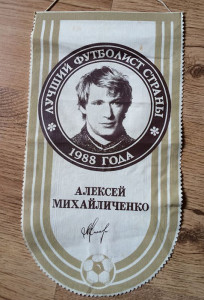 2009, I finally got the chance to visit Kyiv and to see Dynamo play. I saw the monument to Lobanovskyi and outside of the ground, I found this incredible pennant (pictured left) for sale.
2009, I finally got the chance to visit Kyiv and to see Dynamo play. I saw the monument to Lobanovskyi and outside of the ground, I found this incredible pennant (pictured left) for sale.
Dynamo themselves had entirely read the script for me to make a first (and so far only) visit to see them. They beat Tavriya Simferopol 6-0. Also, the player who I’d anointed in my own mind as Miko’s successor as a favourite Dynamo maverick, Artem Milevskiy, embarked on the dribble you can see in the first 20 seconds of this video:
Where Is He Now?
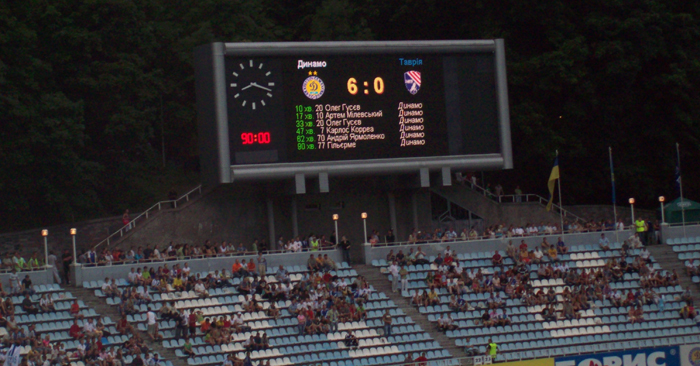
Miko retired from playing when he left Rangers in 1996. He returned to Ukraine and became assistant to Lobanovskyi at Dynamo from 1997 until the iconic coach’s death in 2002. From 2002 to 2004 Miko was Dynamo coach, winning two league titles and the Ukrainian Cup. This wasn’t enough to stop him being replaced in 2004 though, when he became coach of the Ukrainian U21 team instead. He also had 18 months in charge of the full national team but his contract was not renewed after they failed to reach the 2010 World Cup Finals.
I’m indebted to Andrii Maruschak for informing me as to what Miko is up to these days.
“Now Mykhaylychenko is a sport director of Dynamo Kyiv, also he is a professor of the football department in Physical education institute of the Drahomanov national university in Kyiv.”
This led me to also find that Dynamo’s own website has a handy section dedicated to the man himself. Perhaps at some point in the future he’ll leave his beloved Dynamo for the other club where he spent much of his playing career?
*I have no explanation for him having signed Oleg Salenko in 1989, who definitely could not run.

